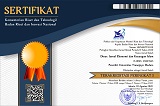The Effect of Syariah People's Business Credit (KUR) And Business Resources on The Productivity of Micro Small and Medium Entrepreneurs (MSME) In Medan, Indonesia
Abstract
This study examines the influence of Sharia People's Business Credit (KUR Syariah) and business resources on the productivity of MSMEs in Medan Marelan District. The research method used is a quantitative research method. The research used in the study entitled the influence of KURS (Shariah People's Business Credit) and Business Resources on MSME Productivity in Medan Marelan District.
The type of research used is a descriptive quantitative research type. Where in this study analyzes the influence of independent variables, namely KURS (people's business credit) and business resources on MSME productivity with the dependent variable being MSME productivity. The population of this study is MSME entrepreneurs in Medan Marelan District consisting of 896 MSMEs. The sampling technique used is the Slovin method. From the calculation results above, the sample of this study was rounded up to 90 MSMEs in Medan Marelan District.
This result indicates that 82.3% of MSME productivity variations are influenced by these two variables, while 17.7% are influenced by other factors. Therefore, optimizing access to KUR Syariah, business assistance, and innovative strategies are necessary to enhance MSME competitiveness sustainably. These findings confirm that access to sharia financing and the optimization of business resources can significantly improve MSME productivity. Therefore, the government and sharia financial institutions should continue to promote the broader utilization of KUR Syariah and provide assistance in business management. Additionally, MSME actors are encouraged to develop more innovative business strategies, including business digitalization and improved management quality, to enhance competitiveness and sustainable business growth.
Keywords
Full Text:
PDFReferences
Alhifni, A., & Mawardi, I. (2017). Optimization Of Cooperation Network Between The Government, Private Sectors And Universities In Strengthening Sme Capital Through Islamic Micro Finance In Indonesia. Researchers World : Journal of Arts, Science and Commerce, VIII(1), 18–27. https://doi.org/10.18843/RWJASC/V8I1/03
Baharin, R., Syah Aji, R. H., Yussof, I., & Saukani, N. M. (2020). Impact of Human Resource Investment on Labor Productivity in Indonesia. Interdisciplinary Journal of Management Studies (Formerly Known as Iranian Journal of Management Studies), 13(1), 139–164. https://doi.org/10.22059/IJMS.2019.280284.673616
Choudhury, M. A. (2021). The Impact of Islamic Development Financing on Poverty Alleviation in Indonesia. God-Conscious Organization and the Islamic Social Economy, 241–258. https://doi.org/10.4324/9781315585321-20/IMPACT-ISLAMIC-DEVELOPMENT-FINANCING-POVERTY-ALLEVIATION-INDONESIA-MASUDUL-ALAM-CHOUDHURY-TATIK-MARIYANTI
Habib Rana, M., & Shaukat Malik, M. (2016). Human resource management from an Islamic perspective: a contemporary literature review. International Journal of Islamic and Middle Eastern Finance and Management, 9(1), 109–124. https://doi.org/10.1108/IMEFM-01-2015-0002/FULL/PDF
Maarif, S., Abdul Majid, M., & Dzikrulloh, D. (2021). The Influence of Spirituality on The Education of Muslim Micro Small And Medium Entrepreneurs In Jombang, Indonesia. Dinar: Jurnal Ekonomi Dan Keuangan Islam, 8(2), 78–90. https://doi.org/10.21107/DINAR.V9I1.22534
Nasution, J., Abdul Fattah, M., & Sumatera Utara, U. (2022). ANALYSIS OF TEMPE PRODUCTION MICRO BUSINESS STRATEGY IN INCREASING INCOME IN THE COVID-19 PANDEMIC USING SOAR ANALYSIS. Jurnal Ekonomi, 11(02), 1662–1667. https://ejournal.seaninstitute.or.id/index.php/Ekonomi/article/view/2622
Nur’Aini Ihsan, D., Ashuri, R. K., Al Arif, M. N. R., & Zulpawati. (2022). The Relationship Between Human Capital, Halalpreneurs’ Desire, and Halal Awareness: Empirical Evidence from Indonesia’s Micro-Entrepreneurs. Asian Economic and Financial Review , 12(7), 450–458. https://doi.org/10.55493/5002.V12I7.4524
Pujiono, A., Setyawati, R., & Idris, I. (2018). STRATEGI PENGEMBANGAN UMKM HALAL DI JAWA TENGAH DALAM MENGHADAPI PERSAINGAN GLOBAL. Indonesia Journal of Halal, 1(1), 1–7. https://doi.org/10.14710/HALAL.V1I1.3109
Purwanggono, C. J., & Pratiwi, R. (2022). SOAR-Based MSME Competitiveness in Purworejo Regency. Enrichment : Journal of Management, 12(3), 2330–2338. https://doi.org/10.35335/ENRICHMENT.V12I3.658
Rupeika-Apoga, R. (2014). Financing in SMEs: Case of the Baltic States. Procedia - Social and Behavioral Sciences, 150, 116–125. https://doi.org/https://doi.org/10.1016/j.sbspro.2014.09.013
Shahanipour, S., Amindoust, A., Sahraian, K., & Beiranvand, S. (2020). Identification and prioritization of human resource strategies with employees’ creativity approach in administrative organizations using SWOT–ANP. OPSEARCH, 57(1), 119–143. https://doi.org/10.1007/s12597-019-00416-w
Thamrin, D. A., Hanif, F., & Athief, N. (2020). The Use Of Conventional Banks By Sharia Economic Law Students: Practice, Factors, And Laws. Dinar: Jurnal Ekonomi Dan Keuangan Islam, 7(2), 36–44. https://doi.org/10.21107/DINAR.V7I2.9150
Wardi, M., Ismail, I., Zainollah, Z., & Wekke, I. (2019). Entrepreneurship and Financing in Islamic Educational Institution of Darul Ulum Banyuanyar Pamekasan. 25, 1–4.
Yani Balaka, M., & Abyan, F. (2022). METODOLOGI PENELITIAN KUANTITATIF.
DOI: https://doi.org/10.21107/dinar.v10i2.29582
Refbacks
- There are currently no refbacks.
Copyright (c) 2023 Adistia prayoga, Rahmayati

This work is licensed under a Creative Commons Attribution-ShareAlike 4.0 International License.
Journal Dinar Indexed by:
Dinar: Jurnal Ekonomi dan Keuangan Islam by Universitas Trunojoyo Madura is licensed under a Creative Commons Attribution-ShareAlike 4.0 International License.






.png)










